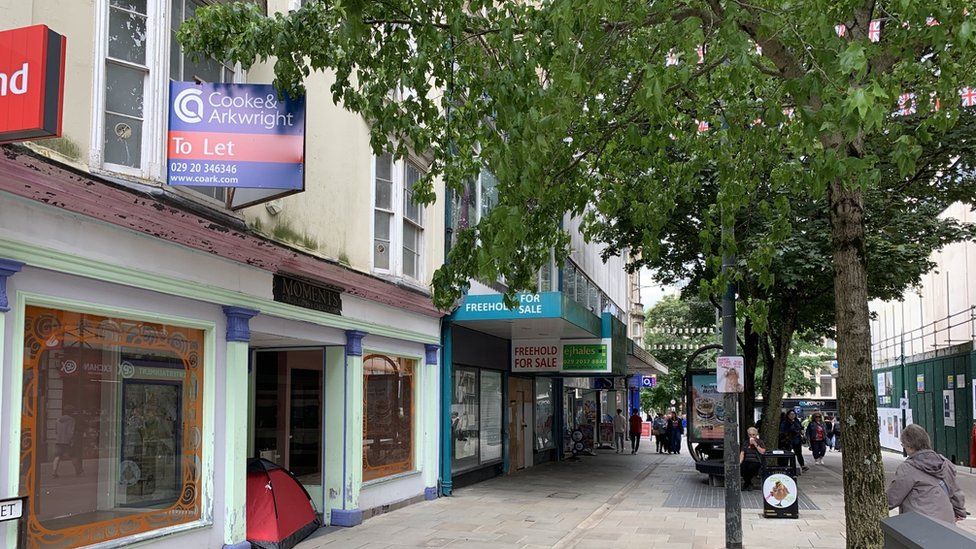
Just over one in six shops on Welsh High Streets are empty, according to the Welsh Retail Consortium
By Matt Murray & Oscar Edwards
BBC Wales News
Wales has the second highest number of vacant shops in the UK, according to new figures.
Just over one in six shops in Wales are empty, analysis from the Welsh Retail Consortium (WRC) shows.
“Clearly that’s bad news for the economy because retail plays such an integral role,” said Sara Jones from the WRC.
The Welsh government said its retail action plan was working to bring “vibrancy” back to town centres.
Sara Jones said Welsh retailers were “grappling with several cost challenges”.
“They come from all different quarters – whether it is business rates, energy prices or local challenges like antisocial behaviour affecting footfall in shops,” she said.
The rate of empty shops in Wales rose from 16.5% to 17.0% in the second quarter of 2023, according to the WRC.
‘It’s a mess’
The WRC data also suggests Newport has more empty units than any other city in the UK.
Shopper Jeanette Scurry, who was shopping in Newport, said: “I usually go to Cardiff or Cwmbran even though I live in Newport.
“But I thought today I’d come to Newport. I don’t know why I bothered. There’s nothing here, it’s a mess.”
High Street and Commercial Street in Newport city centre have many vacant shops and boarded up businesses
John Richards, 79, also from the city, said: “I used to come to Newport and get what I needed and go home with it, but I can’t do that anymore.
“I need to go out of town or to one of big supermarkets.”
Newport City Council said some “significant and high-profile” projects had come to fruition in the city over the last few years, “such as the successful transformation of Newport Market, the regeneration of Market Arcade and the Chartist Tower development.
“These would have formed part of the count of “vacant shops” in the report which looked at around 60 places in the UK and claimed Newport had the highest number of empty units.”It is worth noting that the city council does not own the city centre or the shops.
“A good proportion of empty units are owned by absent or disengaged landlords, but the council is taking action wherever possible to make them take responsibility for taking proper care of their buildings and bring them back into beneficial use.”
The Covid-19 pandemic prompted a huge acceleration to digital and online sales.
In 2006, buying online represented just under 3% of total retail sales. At the start of 2023, the figure was 27%.
Homeware chain Wilko announced last month it was going into administration, putting 12,500 jobs at risk.
Twenty-nine of its stores are in Wales and mainly on High Streets which are already struggling – including in Morriston, Swansea.
Morriston shopper Gillian Roberts said there was “nothing left” on her High Street
“It’s terrible, there’s nothing left in Morriston now,” said shopper Gillian Roberts. “You can eat, get your hair cut, but for shopping this high street has gone to the dogs.”
Mike Williams said Morriston’s High Street consisted of charity shops, cafes and barbers.
“It’s very sad. If you haven’t got a car, you get a bus into town – but now there’s not much in town,” he added.
Elaine Arundale, a regular at the Wilko store in Morriston, said: “What are we going to do? We’re all getting older, and we’ll be lost without it.
“There’s going to be nothing left in Morriston.”
Bucking the trend
But Dr Robert Bowen, a lecturer at Cardiff Business School, said some High Streets in Wales were bucking the trend.
“There are challenging times, but we are seeing different trends across Wales,” he said.
“In 2020, Treorchy won the UK High Street of the Year Award, beating rivals Narberth and Swansea. We’re seeing some really good examples across Wales of High Streets that are doing really well.”
Treorchy, in Rhondda Cynon Taf, was nominated for the award by local pub landlord Adrian Emmett.
He took over The Lion pub in the town eight years ago, and it is now the sponsor of eight sports teams and two choirs.
“The key to our growth in Treorchy has been focusing on independent businesses,” he said.
“We’ve changed our mindset operating as one community and one voice.”
Mr Emmett put the decline of the High Street “down to supermarket and the online traders”.
“It needs to be more than just retail. Rather than the products it’s about the people,” he said.
The Welsh government’s retail action plan, which launched in May, said the key to reversing the trend was increasing footfall and having more people living in towns and city centres.
The Welsh government said: “Our retail sector is one of the largest private sector employers in Wales and has a vital contribution to make to our town and city centres and rural communities.
“In May, we launched our retail action plan to grow and strengthen the sector during a period of significant change and bring vibrancy back into our town centres.”








